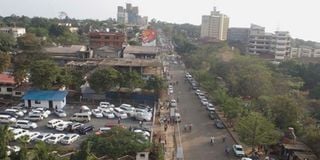Premium
History of tribal exclusion must end

An aerial view of Kisumu City.
What you need to know:
- Developing a region using taxes should not be considered a favour from the State.
- Equity and fairness are ideals we must always strive for – and cherish.
Not too long ago, I came across a social media post by Ambrose Weda, the well-known lawyer-cum-TV commentator, where he was saying he had opted to give his daughter a Nigerian name rather than a Luo one. He wrote that he did so because the Kenyan “power space” was heavily prejudiced against the Luo nation. He “advised” Luo parents to follow his example and not give their children “Luonised” names like Otieno or Anyango.
It was a provocative post, even a troubling one. You can imagine the responses. They were stinging. I too found his premise for discarding genealogical names weird. Still, it set me thinking. Is the anti-Luo prejudice really that bad?
All this came back to me during President Uhuru Kenyatta’s three-day ‘Madaraka’ tour of Luoland. It happened amid crude propaganda that Uhuru was directing all development projects to Luo Nyanza, away from areas that voted for him in 2013 and 2017. The propaganda was intended to play to the ethnic prejudices of Mt Kenya lumpens. As it is, they have become psychologically captive to the toxic propaganda about Luo bogeymen, especially since the Handshake.
The usual charge against Uhuru by his critics is that his development focus is primarily his Mt Kenya home region. This time round, they made a remarkable flip-flop. They put it out that he had neglected other regions, including his own, and diverted the goodies to Luoland. And who was doing the whining? His own Mt Kenya backyard, poisoned as it has become with Tangatanga-spun conspiracy theories of power shifting to the Lakeside.
Marginalised for decades
That is what many Luos found so depressing. First and foremost, they are Kenyans. They are taxpayers like everybody else too. Yet because the President had chosen to come to Luoland to launch various projects there, it was causing all the noise.
Their reply? “We have been marginalised for decades. All we ask is for our share of the national cake. We are not asking for much. We are not greedy like those who want everything concentrated in their enclaves.”
And the inescapable conclusion? Privileged groupings that are now blackmailing the President by shifting their political support to other bandwagons on account of his current engagement with the Luo leadership are only interested in perpetuating this history of Luo exclusion.
Indeed, developing a region using taxes should not be considered a favour from the State. Yet that’s just theory. It’s not the reality of how pork barrel politics works, or is perceived to work. Prejudice goes beyond politics, of course.
From the perspective of Luo Nyanza, the problem has always come from politics. The politics of exclusion. We are taught that the basis of ‘Kenyan-ness’ should transcend tribe. Yet the experience of Luo discrimination is on account of tribe.
Uhuru has changed this dynamic. And that is why he is currently seen in Luoland as unquestionably the most sympathetic Kenyan President they've ever dealt with. Far more appreciated than even the roads and water projects and shipyard he came to launch in Nyanza is the fact that Uhuru has extended a genuine hand of friendship to the region and its leaders. It has never happened before.
Post-election violence
Right now, the President is more popular in Luo Nyanza than he is in Kiambu. He should not be deterred. Unpopularity is nothing as long as you are doing the right thing. Equity and fairness are ideals we must always strive for – and cherish. We cannot build a nation through spite.
In Kisumu, one incident above all else served as a poignant lesson to those communities still stuck in the politics of ethnic intolerance. When Deputy President William Ruto was leaving the venue of the Madaraka Day commemoration, his vehicle was stopped by an enthusiastic crowd at Kondele, the volatile hotbed of Kisumu politics. It was impossible not to contrast that eager reception with the violent one Raila Odinga received in January in Githurai, on the Nairobi-Thika highway, where hooligans stoned his convoy. Reportedly they were hired by a Tangatanga senator from the area.
We often hear the pap that Uhuru's embrace of Raila through the Handshake amounted to a betrayal of Ruto. Did he wake up one morning and, just like that, decide he didn’t want to see Ruto’s face? Come on. And do we ever ask ourselves what Uhuru’s post-2008 embrace of Ruto amounted to in betrayal terms?
During his meeting with Mt Kenya leaders at Sagana State Lodge in January, Uhuru himself narrated how the overwhelming mood in the region at the time was extremely hostile to him having anything to do with Ruto’s side. Emotions were raw over the post-election violence in the Rift Valley. In many ways, the problem still remains unresolved. Well, I guess Uhuru did not want other considerations to override his ambitions then. And so, here we are.
Let me end with one of the responses to lawyer Weda's controversial social media post: “Barack Obama made it despite his name.”
Yes, he did!
Despite centuries of anti-Black prejudice, he became the leader of the most powerful nation on earth.
@GitauWarigi





